《REFLECTIONS ON INTERNATIONAL LAW FROM THE LOW COUNTRIES IN HONOUR OF PAUL DE WAART》
| 作者 | ERIK DENTERS AND NICO SCHRIJVE 编者 |
|---|---|
| 出版 | MARTINUS NIJHOFF PUBLISHERS |
| 参考页数 | 507 |
| 出版时间 | 1998(求助前请核对) 目录预览 |
| ISBN号 | 无 — 求助条款 |
| PDF编号 | 818860528(仅供预览,未存储实际文件) |
| 求助格式 | 扫描PDF(若分多册发行,每次仅能受理1册) |
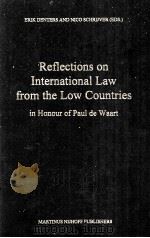
Paul de Waart: A Tireless Advocate of the Rule of Law in International RelationsErik Denters and Nico Schrijver1
PART Ⅰ - INTERNATIONAL ECONOMIC LAW AND DEVELOPMENT13
1 Ten Years after the ILA Declaration of SeoulPieter VerLoren van Themaat13
1. Part Ⅰ: The thesis to be discussed13
1.1Background13
1.2 General starting point13
1.3 Doctrinal transition14
1.4Specific principles15
1.4.1 Equity and solidarity15
1.4.2 The duty to cooperate for global development15
1.4.3 Permanent sovereignty over natural resources17
1.4.4 The principles of equality or non-discrimination17
1.4.5 Science and technology18
2. Part Ⅱ: The verification of the thesis19
2.1Progress in implementing principles 1 and 13 of the Seoul Declaration19
2.2 Progress in implementing the principle of permanent sovereignty over natural resources21
2.3 Recognition of sustainable development and its implementation21
2.4 Good governance23
3. Part Ⅲ: Some concluding remarks24
2 Some Serendipitous Findings in BITs: the Barcelona Traction Case and the Reach of Bilateral Investment TreatiesPaul Peters27
1. Introduction27
2. Development and investment28
3. The scope of BITs29
4. Barcelona Traction30
5. The definition of eligible investors in BITs32
6. Why investments are made indirectly35
7. Different degrees of restrictiveness37
8. Different degrees of liberality37
9. The so-called Barcelona-Traction clauses42
10. Conclusions47
3 The Preferential Status of Developing Countries in International Trade Law after the Uruguay RoundWil D. Verwey48
1. Introduction48
2. The principle of preferential treatment for developing countries as a heritage of the NIEO Resolutions51
3. The body of global international trade law after the Uruguay Round54
4. Preferential status of developing countries after the Uruguay Round55
4 Taxation of Foreign Investment in ChinaYuwen Li68
1. Introduction68
2. General principles underlying the foreign investment taxation system70
3. Overview of indirect tax71
3.1Value Added Tax72
3.2 Business tax73
3.3 Consumption tax74
3.4 Problems and solutions75
4. Foreign investment enterprise income tax76
4.1Tax liability76
4.2 Taxable income, tax rates and payment76
4.3 Tax preferences77
4.4 Problems and solutions79
5. Conclusion84
5 Principles of Cooperation for Development in ACP-EC RelationsKarin Arts86
1. Introduction86
2. An analysis of the principles of cooperation for development embodied in and underlying the Lome Conventions87
2.1Solidarity, equality and sovereignty87
2.2 Security88
2.3 Integral approach89
2.4 Human rights, democracy and good governance90
2.5 Sustainability91
3. Principles under attack?92
4. Concluding remarks: Lome, towards a new future?96
PART Ⅱ - HUMAN RIGHTS101
6 Promoting Human Rights in the Global Market PlaceKamal Hossain101
1. Globalization and the promotion of human rights101
2. Impact of globalization on human rights102
3. Structural adjustment, development strategies and human rights106
4. People-friendly markets108
5. Sustainable development, good governance and human rights109
7 ‘Human Rights Human Efforts'. An Inquiry into the Dialectics of Idea and ProjectBas de Gaay Fortman116
1. The human rights idea117
1.1‘Human'118
1.2 Rights119
1.3 Human rights119
2. The international project121
3. Obstacles123
3.1The public-private divide123
3.2 Economic, social and cultural rights126
3.3 Group rights129
4. Conclusions132
8 Mobilization of the Conscience of Mankind: Conditions of Effectiveness of Human Rights NGOsPeter R. Baehr135
1. Introduction135
2. Definition136
3. Reliability139
4. Access versus independence140
5. Representativeness144
6. Cooperation among NGOs147
7. Media Attention150
8. Timing151
9. Conclusions152
9 Diplomatic Immunity in Modern International LawHenry G. Schermners156
1. Introduction156
2. The purposes of the rules157
3. The effect of treaties159
4. Inter-European relations161
5. Non-European States162
6. The effect of customary law163
7. Conclusion164
10 Prevention, Early-warning and Urgent Procedures; a New Approach by the Committee on the Elimination of Racial DiscriminationTheo van Boven165
1. Introduction165
2. A pioneer and precursor166
3. A shift in orientation167
4. The changing context169
5. The Committee's working paper171
6. Prevention of racial discrimination in the Committee's practice172
6.1Types of situations and cases173
6.2 Dialogue with States parties and interaction with regular reporting175
6.3 Illustration of types of action177
7. Relevant general recommendations180
8. Final observations181
11 Women's Rights and the Right to Complain. Towards an Optional Protocol to the Women's Convention?Cees Flinterman183
1. Introduction183
2. The issue of justiciability186
3. Other aspects of an Optional Protocol188
4. Concluding observations189
12 Suitable Employment as a Human RightFrans Joseph Smit191
1. Introduction191
2. Right to work191
3. The concept of suitable employment: protective and binding function192
4. Free choice of employment193
5. The concept of suitable employment194
6. Minimum limit of the concept of suitable employment195
7. Prohibition of forced or compulsory labour196
8. Conclusion197
PART Ⅲ - INTERNATIONAL CRIMINAL JURISDICTION201
13 The International Humanitarian Fact-finding Commission: its Birth and Early YearsFrits Kalshoven201
1. Introduction201
2. The drafting history of Article 90202
2.1First proposals203
2.2 Committee I: third session204
2.3 Fourth session: Working Group of Committee I206
2.4 Fourth session: Committee I208
2.5 Fourth session: Plenary Meeting210
3. Appraisal212
14 International Adjudication of War CrimesGerard Tanja216
1. Introduction216
2. Historical overview216
2.1Early Efforts216
2.2 The Interbellum218
2.3 The Second World War220
2.4 Early United Nations Activities223
3. The creation of the ad hoc international tribunals224
3.1Yugoslavia Tribunal224
3.2 Rwanda Tribunal229
4. Establishment of the Yugoslavia Tribunal232
4.1Legal foundation233
4.2 Host Country Agreement; privileges and immunities239
4.3 The Dayton Agreements240
5. Establishment of the Rwanda Tribunal242
5.1Legal foundation242
5.2 Institutional set-up and seat243
5.3 Functioning and efficiency246
6. Concluding observations247
15 The Role of an International Criminal Court in the Light of the Principle of ComplementarityAdriaan Bos249
1. Jurisdiction of the International Criminal Court249
2. Nature of the provision on competence251
3. Some general thoughts about complementarity252
4. Trial before a national court254
5. Concurrent jurisdiction in relation to the International Criminal Tribunal for the Former Yugoslavia (ICTY)255
6. Complementarity, according to the draft Statute257
7. Conclusion259
16 The International Criminal Tribunal's Power to Issue Subpoena Duces TecumPeter Malanczuk260
1. Introduction260
2. Procedural Background261
3. Text of amicus curiae Brief267
3.1Introduction267
3.2The power of a Judge or Trial Chamber of the International Criminal Tribunal for the Former Yugoslavia to issue a subpoena duces tecum to a sovereign State268
3.2.1 The obligation of States to cooperate with the Tribunal268
3.2.2 The enforcement of the obligation of States to cooperate with the Tribunal271
3.2.3 The power of the Tribunal to issue a subpoena duces tecum to a State273
3.3 The power of a Judge or Trial Chamber of the International Criminal for the Former Yugoslavia to make a request or issue a subpoena duces tecum to a high government official of a State275
3.4 The appropriate remedies to be taken if there is non-compliance of a subpoena duces tecum or request issued by a Judge or a Trial Chamber of the International Criminal Tribunal for the Former Yugoslavia276
3.5 Any other issue concerning this matter277
3.6 Conclusion277
17 Beyond the Limits of the Territoriality PrincipleErnst M. H. Hirsch Ballin278
1. Introduction278
2. Supremacy of territory as a characteristic of sovereignry278
3. Borders and the rise of crime279
4. State sovereignty280
5. Subject and object of jurisdiction282
6. The responsibility principle283
7. Epilogue284
PART Ⅳ - THE UNITED NATIONS AND PEACE AND SECURITY289
18 Provisional Measures of the UN Security CouncilPeter Kooijmans289
1. Introduction289
2. The timing of provisional measures291
3. The addressees of provisional measures294
4. Types of provisional measures295
5. Legal effects of provisional measures298
6. Concluding remarks300
19 Rapid Deployment: a Capacity GapDick A. Leurdijk301
1. Introduction302
2. Stand-by Arrangements For Peace-keeping303
3. UN brigade306
4. Modalities309
5. The Security Council and ‘humanitarian intervention': precedents310
6. The United Nations and ‘humanitarian intervention': an alternative option312
20 The Convention on the Safety of United Nations and Associated Personnel: its Scope of ApplicationRob Siekmann315
1. Introduction315
2. Background316
3. Definition of operations and personnel317
4. Exclusion clause320
5. Conclusion323
21 Reconsidering the Legal Relevance of Structural ViolenceIge F. Dekker324
1. Introduction324
2. Structural violence325
3. Structural violence as a legal concept330
4. Limitations on the internal sovereignty of States333
5. Structural violence and the internal sovereignty of States338
6. Conclusion342
PART Ⅴ - THE PROTECTION OF CULTURAL PROPERTY,HUMAN GENETICS AND THE ENVIRONMENT347
22 The application of the Unidroit Convention on Stolen or Illegally Exported Cultural Objects in Relations between Member States of the European UnionJan A. Winter347
1. Introduction347
2. Article 13 of Unidroit and internal EC rules in relations between EU member States349
3. The protection of cultural heritage in a regional setting; the European Community rules350
3.1Freedom of trade and the protection of cultural objects350
3.2 Common rules for exports to third countries352
3.3 The return of cultural objects unlawfully removed from a member State354
3.4 Salient features of Directive No.93/7356
4. The protection of cultural objects in a worldwide setting; the Unidroit Convention358
4.1Background358
4.2 Contents of the Unidroit Convention359
4.3 Objectives and scope360
4.4 Stolen cultural objects361
4.5 Illegally exported cultural objects363
5. Unidroit in EU member States365
6. Conclusions371
23 Citizens' Rights and Human Rights in the Fields of Human Genetics and Embryology: a SurveyMarc Cogen373
1. Introduction373
2. National law375
2.1Belgium375
2.2 The Netherlands375
2.3 France376
2.4 United Kingdom378
2.5 United States381
3. European law384
3.1The Council of Europe384
3.2 The European Union388
4. International law391
5. Tentative conclusions394
24 Ecospace Rights: Sharing or DividingJoyeeta Gupta398
1. Introduction398
2. Towards the Kyoto Protocol and beyond399
3. Reality of the post-Rio period401
4. Analysis403
5. Towards a framework for analyzing allocational issues408
6. Conclusion413
PART Ⅵ - INTERNATIONAL DISPUTE SETTLEMENT417
25 Reflections on some Recent Incidental Proceedings before the International Court of JusticeKarel C. Wellens417
1. Introduction417
2. Particular features of recent cases before the Court418
3. The requests for and indications of provisional measures419
3.1Some general features419
3.2Relevant elements of a mere general nature420
3.2.1 The request for provisional measures and the subsequent proceedings on the merits of the case420
3.2.2 The time factor421
3.2.3 Two consecutive requests423
3.2.4 Prima facie consideration424
3.2.5 Injunctions, declaratory measures and their addressees426
3.2.6 The discretionary power of the President of the Court under Article 74, paragraph 4 of the Rules of the Court427
4. Applications for permission to intervene under Article 62 of the Statute429
4.1An application filed before a Chamber429
4.2 Plurality of issues in the subject-matter of the dispute431
4.3 An intervening State, but also an indispensable party?433
4.4 The burden of proof434
4.5 The problem of the jurisdictional link436
4.6 The procedural rights of the intervener438
4.7 The effect of a judgment on an intervener439
5. Concluding remarks440
26 The Indispensable Parties Rule in the East Timor CaseNeri Sybesma-Knol442
1. Introduction442
2. A bit of history443
3. The claim of Portugal before the Court446
4. The Court's Judgement: ‘a decision not to decide'447
5. The application of the ‘Indispensable Parties' principle448
6. The ‘Indispensable Parties' principle in the jurisprudence of the Court450
7. New insights in the indispensable parties principle452
8. Conclusions456
27 Third Parties in GATT/WTO Dispute Settlement ProceedingsFriedl Weiss458
1. Preliminary remarks458
2. Apercu of the GATT/WTO Dispute Settlement System459
2.1Historical evolution of dispute settlement459
2.2 General features460
2.3 The single integrated system460
2.4Interim and Appellate Review461
2.4.1 Interim Review461
2.4.2 Appellate Review461
2.5 Surveillance: implementing rulings and recommendations462
2.6 Concluding remarks462
3. Status of Third Parties in Panel and Appelate Body Proceedings462
3.1The wider context of international law462
3.2Rules governing Third Parties463
3.2.1 General remarks463
3.2.2 Evolution of the rules464
3.3Status of Third Parties in Panel practice466
3.3.1 Reasons for Third Party involvement in panel proceedings466
3.3.2 Treatment of third party submissions by panels468
4. Concluding observations471
28 The Bailiff and the Obligations of the State under Public International LawBert Barnhoorn473
1. Introduction473
2. The current legal situation474
3. The proposed amendments477
4. The motives behind the amendments478
5. The need for information479
6. Preventing embarrassment to the state482
7. Conclusions488
ANNEXES490
ⅠBiographical data of Paul J.I.M. de Waart490
Ⅱ Bibliography of Paul J.I.M. de Waart492
Index501
1998《REFLECTIONS ON INTERNATIONAL LAW FROM THE LOW COUNTRIES IN HONOUR OF PAUL DE WAART》由于是年代较久的资料都绝版了,几乎不可能购买到实物。如果大家为了学习确实需要,可向博主求助其电子版PDF文件(由ERIK DENTERS AND NICO SCHRIJVE 1998 MARTINUS NIJHOFF PUBLISHERS 出版的版本) 。对合法合规的求助,我会当即受理并将下载地址发送给你。
高度相关资料
-

- PROCEEDINGS OF THE VIITH INTERNATIONAL CONFERENCE ON LOW TEMPERATURE PHYSICS
- 1961 UNIVERSITY OF TORONTO PRESS
-

- THE INFLUENCE OF RELIGION ON THE DEVELOPMENT OF INTERNATIONAL LAW
- 1991 MARTINUS NIJHOFF PUBLISHERS
-

- THE ACQUISITION OF TERRITORY IN INTERNATIONAL LAW
- 1963 MANCHESTER UNIVERSITY PRESS
-

- THE CONCEPT OF TREATY IN INTERNATIONAL LAW
- 1996 KLUWER LAW INTERNATIONAL
-

- WILLIAM HOWARD TAFT AND UNITED STATES FOREIGN POLICY:THE APPRENTICESHIP YEARS 1900-1908
- 1975 UNIVERSITY OF ILLINOIS PRESS
-

- REFLECTIONS ON THE DECLINE OF SCIENCE IN ENGLAND
- 1969 GREGG INTERNATIONAL PUBLISHERS LIMITED
-

- Ideas in Action:Essays on Politics and Law in Honour of Peter Russell
- 1999 University of Toronto Press
-
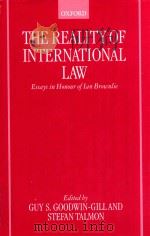
- The Reality of International Law Essays in Honour of Ian Brownlie
- 1999 Clarendon Press
-

- The International Law on The Rights of the Child
- 1995 Martinus Nijhoff Publishers
-
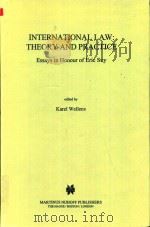
- International Law Theory and Practice Essays in Honour of Eric Suy
- 1998 Martinus Nijhoff Publishers
-
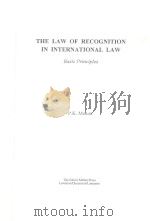
- The Law of Recognition in International Law Basic Principles
- 1994 Edwin Mellen Press
-
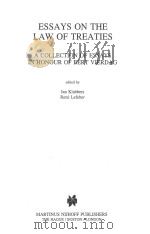
- ESSAYS ON THE LAW OF TREATIES:A COLLECTION OF ESSAYS IN HONOUR OF BERT VIERDAG
- 1998 MARTINUS NIJHOFF PUBLISHERS
-

- THE IDEA OF THE NATURAL LAW IN THE WRITINCS OF CIORGIO DEL VECCHIO
- 1970 DEPARTMENT OF PHILOSOPHY
提示:百度云已更名为百度网盘(百度盘),天翼云盘、微盘下载地址……暂未提供。➥ PDF文字可复制化或转WORD

